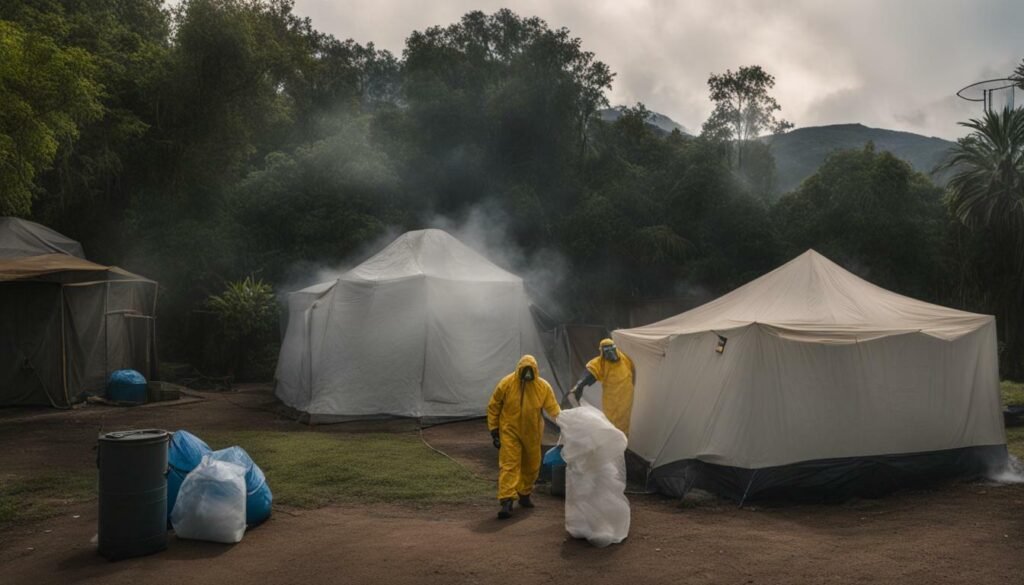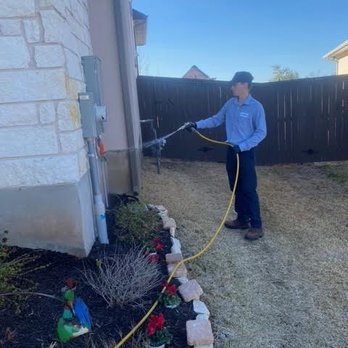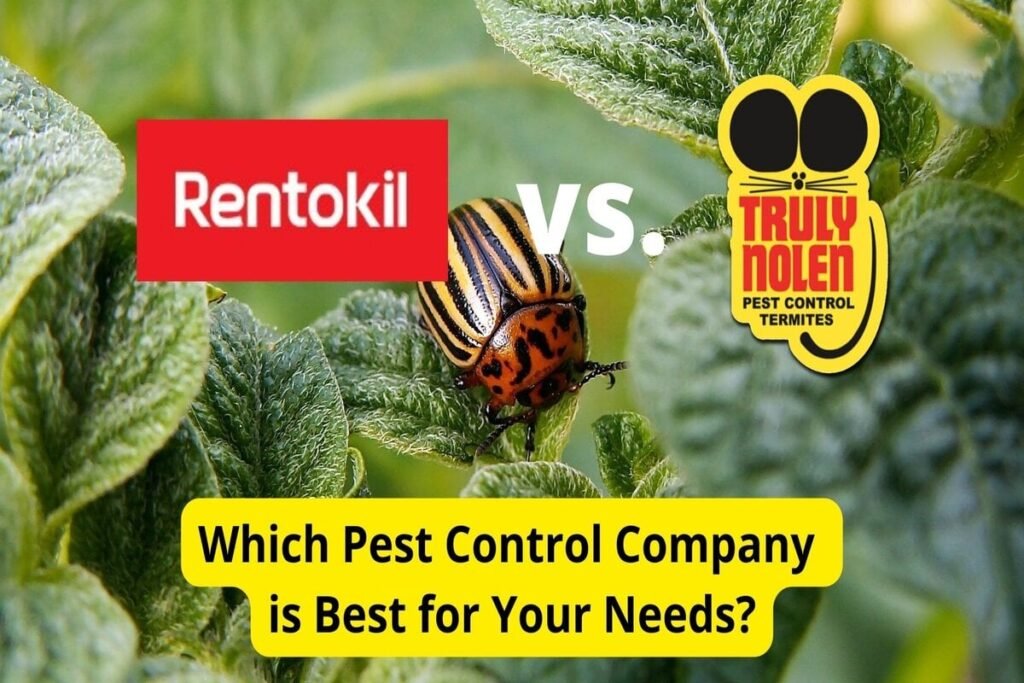Concerned about the safety of termite treatment and its potential toxicity to humans? Read on to discover the facts.
Key Takeaways:
- Termite treatment can be toxic to humans if the chemicals are not handled properly.
- Certain pesticides used for termite control, such as chlordane and heptachlor, have been linked to health issues including cancer, neurological disorders, and reproductive disorders.
- Alternative chemicals are considered safer but may come at a higher cost.
- It is crucial to follow instructions and take precautions when using termite pesticides to minimize the risk of toxicity to humans.
- Organic termite repellents can be a safer alternative to traditional pesticides.
The Potential Health Risks of Termite Treatment
Termite treatment involves the use of chemicals that can potentially impact human health. Let’s explore the potential health risks associated with these treatments.
When it comes to termite control, certain pesticides have been linked to health issues. For instance, chemicals such as chlordane and heptachlor have been found to pose significant risks. Studies have shown that exposure to these chemicals can increase the likelihood of developing cancer, neurological disorders, and reproductive disorders. It’s important to note that although these chemicals have been banned for agricultural use due to their harmful effects, they are still permitted for termite control.
Toxicity from termite treatments can have serious consequences for homeowners. Improper handling of these chemicals can result in contamination, leading to health problems and financial losses. The potential hazards associated with termite treatment should not be taken lightly, and precautions must be taken to protect human health.
Fortunately, there are safer alternatives to traditional pesticides. While these alternative chemicals may come at a higher cost, they offer a reduced risk of toxicity to humans. It’s crucial to follow instructions provided with termite control products and take necessary safety precautions to minimize exposure and protect your health during the treatment process. Additionally, organic termite repellents are emerging as a safer alternative to traditional pesticides, providing effective pest control while prioritizing human safety.


| Chemical | Health Risks |
|---|---|
| Chlordane | Increased risk of cancer, neurological disorders |
| Heptachlor | Potential reproductive disorders |
By understanding the potential health risks of termite treatment and implementing safer alternatives, homeowners can achieve effective pest control while safeguarding their own well-being. It is always advisable to seek professional termite treatment services to ensure the proper application of chemicals and minimize risks. With proper precautions and responsible practices, termite control can be achieved without compromising human safety.
The Link Between Certain Chemicals and Health Issues
Certain chemicals utilized in termite control have been associated with various health issues in humans. Let’s explore the link between these chemicals and potential harm to people.
Chemicals such as chlordane and heptachlor, commonly used in termite treatment, have been found to have detrimental effects on human health. These pesticides have been linked to serious health problems including cancer, neurological disorders, and reproductive disorders. While these chemicals have been banned for agricultural use due to their harmful impact, they are still permitted for termite control.
Exposure to these toxic chemicals can pose significant risks to human health. It is crucial for homeowners and professionals handling termite control to be aware of these risks and take necessary precautions. Inadequate handling or improper application of these chemicals can lead to contamination, resulting in severe health consequences for individuals and potential financial losses for homeowners.
Fortunately, there are safer alternatives available for termite treatment. While these alternatives may come with a higher cost, they are considered to be less harmful to human health. It is important to carefully consider the potential risks and benefits of using alternative chemicals, weighing the expense against the potential health hazards associated with traditional pesticides.
Table: Potential Health Risks of Certain Termite Control Chemicals
| Chemical | Potential Health Risks |
|---|---|
| Chlordane | Cancer, neurological disorders, reproductive disorders |
| Heptachlor | Cancer, neurological disorders, reproductive disorders |
When using any termite control chemicals, it is crucial to follow instructions provided by manufacturers or seek professional assistance. Taking proper safety precautions, such as ensuring proper ventilation, using personal protective equipment, and storing chemicals securely, can help minimize the risk of toxicity to humans during termite treatment.
Organic termite repellents offer a safer alternative to traditional pesticides. These natural solutions are effective in repelling termites while posing minimal risks to human health. By opting for organic repellents, homeowners can prioritize their safety while achieving efficient termite control.
In summary, certain chemicals used in termite control have been associated with various health issues in humans. It is essential to understand and mitigate the potential risks by following safety precautions, considering alternative chemicals, and seeking professional expertise. By striking a balance between termite treatment effectiveness and human safety, homeowners can protect their health and homes from these destructive pests.
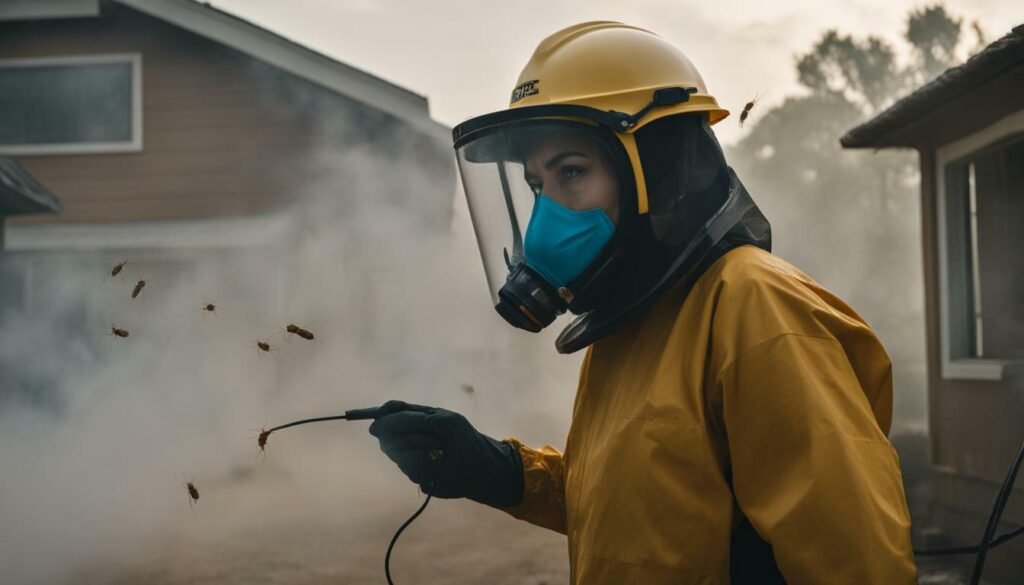

Regulation and Contamination Concerns
The safety of termite treatment practices raises concerns regarding both regulation and potential contamination. Let’s examine the regulatory aspects and contamination risks associated with termite treatment.
When it comes to regulation, certain chemicals used in termite control, such as chlordane and heptachlor, have been banned for agricultural use due to their adverse health effects. However, these chemicals are still permitted for termite control. This raises questions about the safety of their use and the potential risks posed to human health.
The continued allowance of these chemicals for termite treatment has resulted in cases of contamination. Improper handling of termite control chemicals may lead to accidental spills or leaks, contaminating the surrounding environment and posing a risk to both humans and other organisms. Contamination can have serious consequences, not only for the health of individuals but also for the ecosystem as a whole.
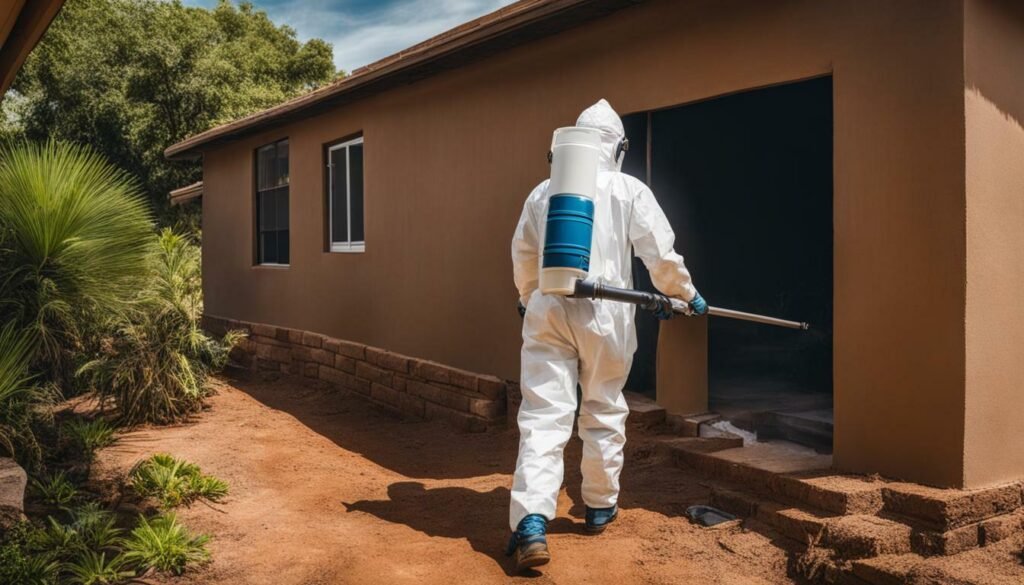

In order to address these concerns, it is crucial to have stringent regulations in place to ensure the safe use and disposal of termite control chemicals. Additionally, homeowners and professionals involved in termite treatment should strictly adhere to safety protocols to minimize the risk of contamination and safeguard human health.
| Regulatory Aspects | Contamination Risks |
|---|---|
| Regulations should be enforced to restrict the use of harmful chemicals in termite treatment. | Improper handling of termite control chemicals can lead to contamination of the environment. |
| Regular inspections and monitoring can ensure compliance with safety guidelines. | Contamination poses risks to human health and the overall ecosystem. |
| Education and awareness programs are necessary to inform homeowners and professionals about the potential dangers of termite treatment chemicals. | Precautionary measures should be taken to prevent spills, leaks, or other forms of contamination during termite treatment. |
Please note that the provided table is not complete and needs further information to be filled in. This is just a placeholder to demonstrate how the table should be structured.
Safer Alternatives to Traditional Pesticides
Safer alternatives to traditional pesticides exist for termite treatment, providing homeowners with options that prioritize human safety. Let’s explore these alternatives and the safety precautions to be taken.
When it comes to termite control, using alternative chemicals can significantly reduce the risk of toxicity to humans. These alternatives, such as borates and botanical insecticides, are considered safer options and have been shown to effectively eliminate termites without posing serious health risks.
Borates, for example, are commonly used in termite treatments and are relatively non-toxic to humans. They are derived from natural mineral salts and work by disrupting the termites’ digestive systems, ultimately leading to their eradication. Borates can be applied as a liquid, foam, or dust and are generally safe to use around pets and children when applied according to the instructions provided.
Botanical insecticides, on the other hand, are derived from plant extracts and offer a more environmentally friendly alternative to traditional pesticides. These natural products, such as neem oil and pyrethrin, are effective against termites while being less harmful to humans. However, it is important to note that even natural pesticides should be used with caution and in accordance with the manufacturer’s instructions.
| Alternative Chemicals | Safety Precautions |
|---|---|
| Borates | – Follow application instructions – Use protective equipment, such as gloves and goggles – Avoid inhaling or ingesting the product – Keep children and pets away from treated areas |
| Botanical insecticides | – Read and follow label instructions carefully – Apply in well-ventilated areas – Wear protective clothing and gear – Keep treated areas off-limits to children and pets – Store and dispose of products properly |
By opting for these safer alternatives and taking necessary safety precautions, homeowners can effectively combat termite infestations while prioritizing the well-being of their families and the environment.
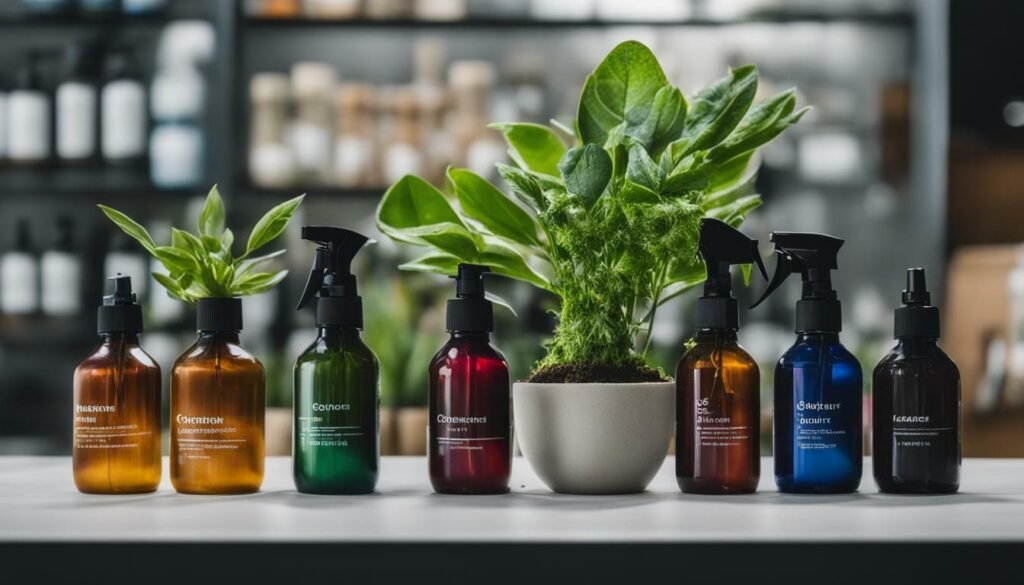

Organic Termite Repellents as a Safer Alternative
Organic termite repellents offer homeowners a safer alternative to traditional pesticides, minimizing the risk of harm to humans. Let’s explore the advantages of using organic solutions for termite treatment.
One of the key benefits of organic termite repellents is their lower toxicity compared to chemical-based pesticides. These natural solutions are derived from plant extracts, essential oils, and other organic ingredients that are safe for humans and pets. By using organic repellents, you can effectively control termites while reducing the potential health risks associated with toxic chemicals.
Benefits of Organic Termite Repellents
Not only are organic termite repellents safer for human use, but they also offer several other advantages. Firstly, these natural solutions are environmentally friendly, minimizing the impact on the ecosystem. Unlike chemical pesticides that can contaminate soil and water sources, organic repellents break down quickly and do not leave harmful residues.
Furthermore, organic termite repellents are often biodegradable, ensuring that they do not contribute to long-term pollution. This makes them an ideal choice for those seeking sustainable and eco-friendly termite control options. Additionally, these repellents are odorless or have a pleasant scent derived from natural ingredients, making them a more appealing choice for use in and around your home.
| Advantages of Organic Termite Repellents | |
|---|---|
| Lower toxicity to humans and pets | Minimizes health risks |
| Environmentally friendly | Reduces ecosystem impact |
| Biodegradable | Does not contribute to long-term pollution |
| Pleasant or odorless scent | Offers a more appealing option |
Using organic termite repellents is not only safer for your family but also helps protect the environment. By opting for natural solutions, you can effectively control termites while minimizing the risk of toxicity to humans and reducing your ecological footprint.
When choosing organic termite repellents, look for products that are certified organic and have been tested for effectiveness. While organic alternatives may have a slightly higher cost compared to traditional pesticides, investing in your family’s safety and the environment is well worth it.


In conclusion, organic termite repellents provide homeowners with a safer alternative to traditional pesticides. By using these natural solutions, you can effectively control termites while minimizing the risk of harm to humans and reducing environmental impact. Remember to follow the instructions provided with the organic repellents and take necessary precautions to ensure safe and effective termite treatment.
Following Instructions for Safe Termite Treatment
Properly following instructions and safety precautions is vital to ensure safe termite treatment. Let’s explore the essential steps homeowners should take to protect themselves during the process.
1. Read and Understand Product Labels: Before using any termite treatment, carefully read and understand the product labels. Pay close attention to the directions for use, safety precautions, and recommended protective gear. Different products may have specific application methods and safety requirements.
| Safety Precautions | Recommended Protective Gear |
|---|---|
| Wear protective clothing, including long sleeves, long pants, and closed-toe shoes. | Gloves |
| Avoid smoking, eating, or drinking while applying termite treatment. | Protective eyewear |
| Keep children and pets away from treated areas until the product has dried. | Respirator mask |
2. Follow Application Instructions: Ensure that you apply termite treatment according to the recommended dosage and application methods. Avoid over-applying the product, as this may pose additional risks. Be cautious when using aerosol sprays, as they can easily be inhaled. If using termite bait stations, position them away from areas frequented by humans and pets.
Remember, safety guidelines are there for a reason. By following proper application techniques, you reduce the potential for exposure to toxic chemicals during termite treatment.
3. Ventilation and Cleanup: When using termite treatment indoors, ensure proper ventilation by opening windows and using fans to circulate air. After application, clean up any spills or excess product immediately. Dispose of treated materials and empty containers properly, following local regulations for hazardous waste disposal.
By adhering to these safety precautions, you can minimize the risk of exposure to toxic chemicals and protect your health during termite treatment.


Additional Resources:
- Protecting Children and Pets from Pesticides Used in Wood Treatment
- Protecting Your Family from Pesticides: How to Use Pesticides Safely
The Importance of Professional Termite Treatment
Hiring professional termite treatment services can significantly reduce the health risks associated with DIY treatments. Let’s explore the advantages of entrusting termite control to experts.
When it comes to termite treatment, the expertise and knowledge of professionals are invaluable. They understand the potential health risks associated with termite control and are equipped to handle the chemicals safely. By relying on their experience, you can minimize your exposure to toxic substances and protect your health.
Professional termite treatment also ensures that the appropriate safety precautions are taken. They follow strict guidelines and protocols to ensure the proper application and handling of termite control chemicals. By adhering to these safety measures, they mitigate the risk of contamination and potential health hazards.
Moreover, professionals have access to a wider range of treatment options, including safer alternatives to traditional pesticides. They can recommend organic termite repellents that are not only effective in eradicating termites but also pose minimal risks to human health. These alternatives can provide you with peace of mind knowing that your home is being treated with your safety in mind.


| Advantages of Professional Termite Treatment |
|---|
| Expertise and knowledge in handling toxic chemicals |
| Strict adherence to safety precautions |
| Access to safer alternatives to traditional pesticides |
Tips to Minimize Exposure and Protect Your Health
Taking proactive steps to minimize exposure and protect your health is crucial when dealing with termite treatment. Let’s explore practical tips to ensure your safety during the eradication process.
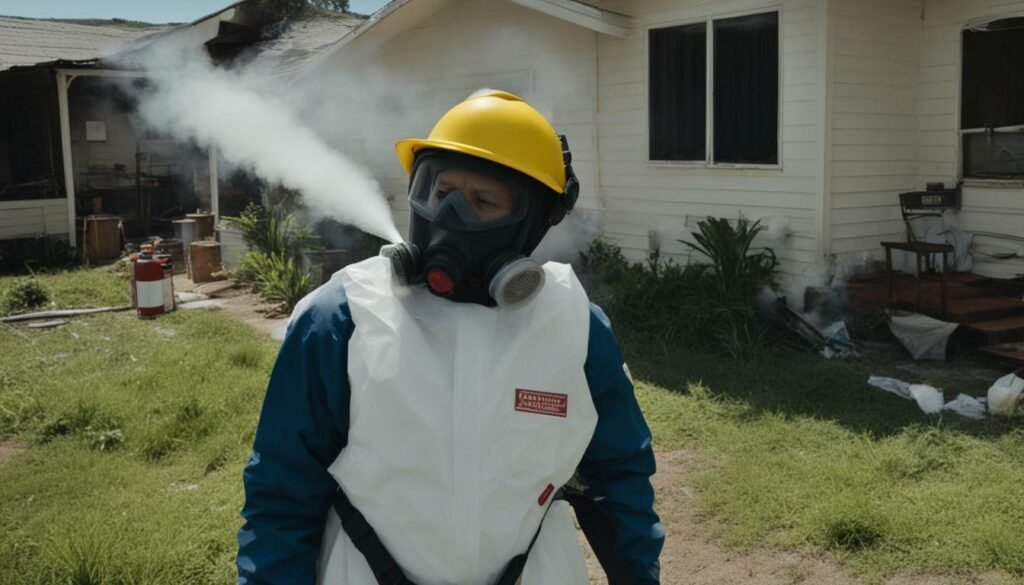

To begin with, it is essential to follow the instructions provided with termite control products. These instructions outline the proper usage and safety precautions that should be followed. Pay close attention to the recommended dosage, application techniques, and any specific safety gear that may be required.
When applying termite treatment, it is important to wear appropriate personal protective equipment (PPE). This may include gloves, goggles, and a mask to protect against chemical exposure. Additionally, ensure that the area being treated is well-ventilated to minimize the inhalation of fumes.
Safety Precautions Checklist:
- Read and follow the instructions provided with termite control products.
- Wear personal protective equipment (PPE) such as gloves, goggles, and a mask.
- Ensure proper ventilation in the treated area.
- Keep children and pets away from the treated area.
- Store termite control products in a secure place, out of reach of children.
In addition to these precautions, it is advisable to consult a professional termite control service. Professionals have the expertise and knowledge to handle termite control chemicals safely, reducing the risk of exposure and potential harm to humans. They can also provide alternative solutions that are considered safer and more environmentally friendly.
By following these tips and taking necessary precautions, you can minimize the risk of toxicity to humans during termite treatment. Remember, your health and safety should always be the top priority when dealing with pest eradication.
| Termite Treatment Safety Tips | Details |
|---|---|
| 1. Read and follow instructions | Refer to the product label for proper usage and safety guidelines. |
| 2. Wear personal protective equipment | Use gloves, goggles, and a mask to protect against chemical exposure. |
| 3. Ensure proper ventilation | Open windows and doors to allow fresh air to circulate during treatment. |
| 4. Keep children and pets away | Restrict access to treated areas to prevent accidental exposure. |
| 5. Store products securely | Keep termite control products out of reach of children in a locked cabinet. |
By implementing these safety measures, you can protect yourself and your loved ones while effectively addressing termite infestations.
Balancing Termite Treatment and Human Safety
Achieving a balance between effective termite treatment and human safety is key. Let’s explore how to integrate these priorities for optimal results.
When it comes to termite control, it is important to understand the potential health risks associated with the chemicals used in the treatment process. Certain pesticides, such as chlordane and heptachlor, have been linked to serious health issues including cancer, neurological disorders, and reproductive disorders. While these chemicals have been banned for agricultural use, they are still permitted for termite control. This highlights the need for caution and proper handling to minimize the risk of toxicity to humans.
To ensure your safety during termite treatment, it is crucial to follow the instructions provided with the products you are using. These instructions outline important safety precautions that should be taken, such as wearing protective clothing and ensuring proper ventilation. By adhering to these guidelines, you can significantly reduce the risk of exposure to harmful chemicals.
Alternatively, you may consider opting for safer alternatives to traditional pesticides. While these alternative chemicals may come with a higher cost, they are considered less toxic to humans. Organic termite repellents, for example, provide an effective and safer solution for termite control. These repellents are non-toxic and do not pose a threat to human health, making them a viable option for those concerned about potential toxicity risks.
In summary, when it comes to termite treatment, it is crucial to prioritize human safety alongside effective pest control. By taking precautionary measures, following instructions carefully, and considering safer alternatives, you can protect your health while successfully eradicating termites from your property.
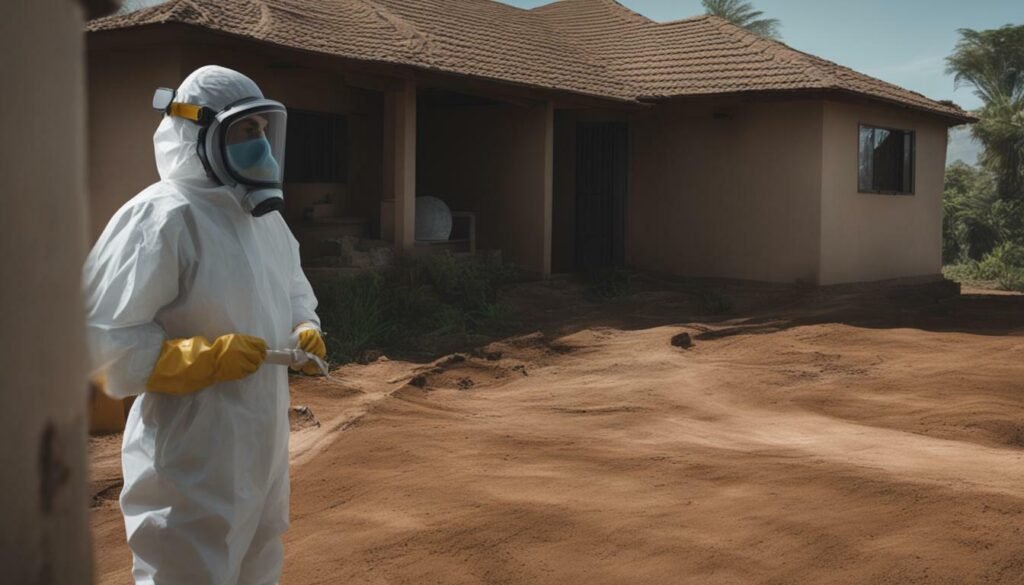

Conclusion
Understanding the potential toxicity risks of termite treatment to humans is crucial for safeguarding your health. By adopting necessary precautions and exploring safer alternatives, you can effectively eradicate termites while prioritizing your well-being.
Termite treatment can be toxic to humans if the chemicals used are not handled properly. Certain pesticides used for termite control, such as chlordane and heptachlor, have been linked to health issues including cancer, neurological disorders, and reproductive disorders. These chemicals have been banned for agricultural use but are still permitted for termite control. Exposure to these chemicals can lead to serious health problems, and some homeowners have experienced significant losses due to contamination.
Fortunately, there are safer alternatives to traditional pesticides available. While these alternative chemicals may come with a higher cost, they are considered to be safer for human health. It is important to follow instructions provided with termite control products and take precautions to minimize the risk of toxicity to humans during termite treatment. Proper ventilation, the use of personal protective equipment, and other safety measures should be implemented.
In addition to alternative chemicals, organic termite repellents can also be a safer option. These solutions offer effective termite control while ensuring human safety during the treatment process. By using organic repellents, you can reduce your exposure to potentially harmful chemicals.
In conclusion, it is vital to prioritize your health when dealing with termite treatment. Understanding the potential toxicity risks and taking the necessary precautions can help you effectively eradicate termites while minimizing the impact on your well-being. Explore safer alternatives, follow instructions, and consider seeking professional termite treatment services to ensure human safety during the eradication process.
FAQ
Q: Is termite treatment toxic to humans?
A: Termite treatment can be toxic to humans if the chemicals used are not handled properly. Certain pesticides used for termite control have been linked to health issues including cancer, neurological disorders, and reproductive disorders.
Q: What are the potential health risks of termite treatment?
A: The chemicals used in termite control can have adverse effects on human health. Exposure to these chemicals can lead to serious health problems. It is important to understand the potential risks involved and take necessary precautions to safeguard your health.
Q: Are certain chemicals used in termite treatment harmful to humans?
A: Yes, certain chemicals used in termite control, such as chlordane and heptachlor, have been linked to health issues including cancer, neurological disorders, and reproductive disorders. These chemicals have been banned for agricultural use but are still permitted for termite control.
Q: Are there regulation and contamination concerns with termite treatment?
A: Yes, there are regulation and contamination concerns surrounding termite treatment. Certain chemicals used in termite control have been banned for agricultural use due to their adverse effects on human health. Improper handling of termite control chemicals can lead to contamination and potential losses for homeowners.
Q: Are there safer alternatives to traditional pesticides for termite treatment?
A: Yes, there are safer alternatives to traditional pesticides for termite treatment. While these alternative chemicals are considered safer for human health, they may come with a higher cost. It is important to weigh the benefits and risks when choosing a termite treatment method.
Q: Can organic termite repellents be a safer alternative?
A: Yes, organic termite repellents can be a safer alternative to traditional pesticides. They are considered safer for human health and can effectively control termites without the use of harmful chemicals. Consider using organic solutions to ensure human safety during termite treatment.
Q: What precautions should I take when using termite pesticides?
A: It is important to follow instructions and take precautions when using termite pesticides to minimize the risk of toxicity to humans. Proper ventilation, the use of personal protective equipment, and other safety measures should be employed during the application and use of termite treatment products.
Q: Is professional termite treatment a safer option?
A: Yes, seeking professional termite treatment services can minimize health risks associated with DIY treatments. Professionals have the expertise and knowledge to handle termite control chemicals safely, ensuring human safety during the treatment process.
Q: How can I minimize exposure and protect my health during termite treatment?
A: To minimize exposure to termite treatment chemicals and protect your health, ensure proper ventilation during treatment, use personal protective equipment such as gloves and masks, and follow all safety instructions provided. It is important to prioritize your health and safety during the termite eradication process.
Q: How should I balance termite treatment effectiveness with human safety?
A: Balancing termite treatment effectiveness with human safety is crucial. While eradicating termites is important, it is equally important to prioritize safe practices and minimize potential risks to human health. By following safety precautions and considering safer alternatives, you can achieve a balance between effective termite control and human safety.
(H3>Q: How do I conclude my termite treatment?
A: In conclusion, it is important to be aware of the potential toxicity risks associated with termite treatment to humans. Taking necessary precautions and following instructions can help minimize these risks. Consider using safer alternatives and seeking professional termite treatment services to ensure human safety during the eradication process.
Source Links
- https://www.ncbi.nlm.nih.gov/books/NBK217619/
- https://paidepo.com/blogs/news/is-termite-and-termite-repellent-poisonous-what-happens-if-person-consume-it
- https://www.washingtonpost.com/archive/politics/1987/04/12/chemicals-used-to-fight-termites-can-exact-human-toll/756d1d2d-aed7-4807-9467-05e49046d897/
Your Expert in Animal Control and Extermination. Trust our experience for humane, effective pest management, protecting your property and ensuring peace of mind with Michael S.

